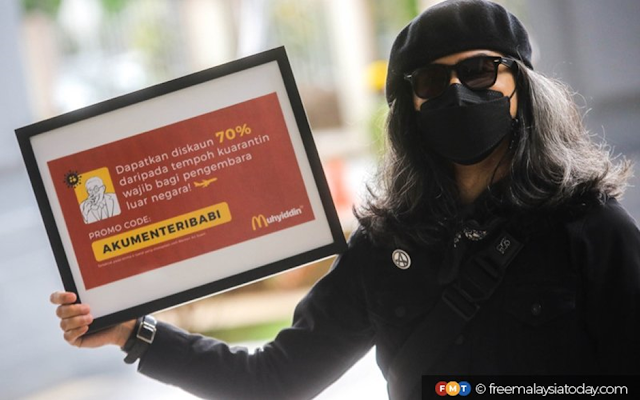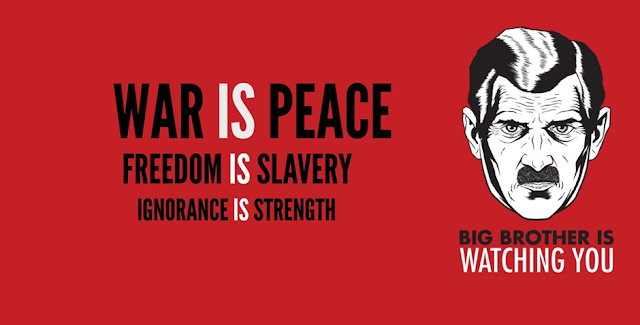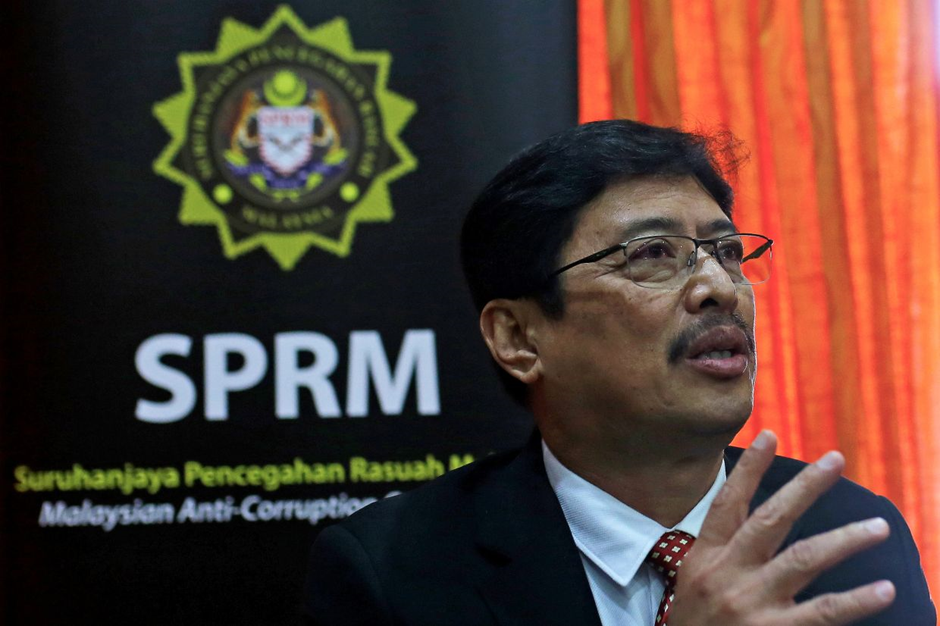My brother bought that Doublethink
It is an overplayed cliché to
compare governmental overreach and abuse to George Orwell’s seminal Nineteen
Eighty-Four. Indeed, when the serious political point one is trying to make
has its own Know
Your Meme subdirectory, it might be arrogantly ignoring fate to bull-headedly
press on. It should come to no surprise to the regular reader that with the piling
on of yet more police scrutiny onto the whistleblower of MACC Chief
Commissioner YBhg. Tan Sri Dato’ Sri Haji Azam bin Baki’s apparent
shareholdings; we have prepared some thoughts regarding how Orwellian the
Malaysian state apparatus has been in its handling of the entire ‘Azamgate’ fracas.
The Force of Law & Thoughtcrime
Explicitly without implying
fault, criticism, or forejudgement; Azam’s MYR
10 Million defamation suit against the whistleblower could be argued to bear
many of the hallmarks of a Strategic Lawsuit Against Public Participation (SLAPP
suit). SLAPP suits are typically employed as a legal tactic, and claimants
in many cases do not have an earnest interest in winning the suit or the
damages specified; instead seeking to utilise the burden of legal proceedings
and/or a large claims quantum to forestall any further action or criticism by
the defendant. Interested readers might follow-up with John Oliver’s video on the
phenomenon. It may be relevant to note that the claim pursued by Azam
against the whistleblower is one of defamation,
a tort governed in statute by the Defamation
Act 1957; which is reverse onus in that defendants are expected to a
priori prove that an allegedly defamatory statement is not such.
The whistleblower is being
further investigated by PDRM under s233 Communications & Multimedia Act
1998 (CMA) and s505 of the Penal Code. Part of that investigation took the form
of an uninterrupted
three-and-a-half hour interview with the police. s233 CMA is not an
unfamiliar act to observers of Malaysian political life – the statute bars use
of telecommunications networks &c. to “annoy, abuse, threaten or harass”
others. At simple construction, the self-evidently wide drafting of the statute
provides for incredibly broad authority for PDRM and other state organs to
utilise this statute as a general deterrent against opinion of any shade – annoyance
is, after all, a remarkably low bar. The author will readily confess now to
being genuinely annoyed at the current
potato shortage at McDonald’s in the country. As a result, s233 can
effectively be used by the state apparatus to silence any digital communication
with which it does not agree or align.
The lines in Malaysia always blur
at the edges of satire, valid criticism, and hurt feelings: Fahmi Reza was only
today charged with insulting former Minister for Health; and current Minister
for Science, Technology, and Innovation; YB Dato’ Sri Dr. Adham bin Baba with
art created after the latter had announced special quarantine dispensation for
Cabinet Ministers returning from trips abroad. Mr. Fahmi claims trial and was
allowed bail; and the court fixed the 30th of March for next mention.
The impulse of the Malaysian
state to control speech exists both at the micro-level as above; but also at
the macro-level as was seen in the efforts by the authorities to
prevent the #TangkapAzamBaki protests from materialising in force; and with
follow-up actions by PDRM in questioning
protest organisers. It was pointed out at the time, and bears repeating
now: statements reportedly made in the course of the investigation into the
protest by Brickfields district police chief Amihizam Abdul Shukor;
specifically that public gatherings are not permitted without prior police
permission; do not appear to be correct statements of the law as it currently
stands, per s9(1) Peaceful Assembly Act 2012 which only requires 10 days’
notice be provided to PDRM. Chief Amihizam’s statement appears to be recalling the
Police Act 1967, which has since been repealed by the 2012 Act. While it is
clear that under the 2012 Act, PDRM have a legitimate interest and right to
impose restrictions on peaceful assembly as they might deem reasonably
necessary; it seems equally clear that there is a valid discussion to be had
surrounding whether the complete shutdown and arguably heavy-handed approach to
the protestors was proportionate or reasonable given the circumstances.
It should not be a great
revelation of any kind to suggest that, in truth, the state apparatus in the
abstract; or indeed individual actors within it such as ministers or civil
servants; does and do not truly have a vested interest in seeing protest,
satirical artwork, or whistleblowing blog posts censored or taken down. Indeed,
it is difficult to imagine persons occupying positions of such structural and
systemic authority to truly take criticism or satirical insults personally.
Privilege and comfort are incredibly soothing to bruised egos. It is ever
essential to recall the basic principles of structures of authority – they exist
before all other stated goals to self-perpetuate, and will act in any way achievable
to fulfil that basic goal. What is truly dangerous about satire and commentary
is the fact that it encourages and rewards critical thinking and original
thought – poisonous obstacles to the anti-intellectualism enforced upon the Malaysian
population through a politicised and castrated educational system. By flexing
the state’s monopoly on permissible and persuasive violence in attempting to
stifle or silence dissent and criticism – and on a more basic level attempting
to control and police the thoughts of its citizens; the Malaysian state
apparatus is almost comically Orwellian.
“The Thought Police would get him just the same. He had committed— would still have committed, even if he had never set pen to paper— the essential crime that contained all others in itself. Thoughtcrime, they called it”
But look over here; or We Have Always Been At War With Eastasia
No sooner than the proverbial ink
had dried on the story surrounding Azam that the MACC suddenly began to spring
into action with a vigour that had
seemed absent when investigating alleged inducements provided to MPs and
Assemblymen to shift political parties. In January alone, bungalows
occupied by YB Syed Saddiq MP were found in want of investigation, and allegations
of cash gifts and a Toyota Veilfire improperly given to YB Dr. Maszlee Malik MP
also emerged. Perhaps most headline-grabbing of all – the great proverbial political
boogeyman of 1MDB was dragged
out from the dark box in which it lives kicking and screaming to provide a
juicy target for the beleaguered anti-corruption body. A cynical author might even
suggest that the rapidity of new revelations of investigations or potential
investigations amounted to sensory and relativistic overload: Dr. Maszlee
indeed remarks upon the fact that the quantum for which he is being
investigated seems remarkably small, and to quote directly: “lame”.
It is hardly the place of the
author to come to foregone conclusions about potential or ongoing
investigations. Indeed, one has to wonder if all the rooms at Syed Saddiq’s property
are set aside for political offices as shown in his video, or if he
reserves a room or two to host race-baiting hate-speech peddlers
to dinner. What is clear is that in
a torrent of new allegations against politicians and politician-adjacents every
day, the intricacies of whose brother bought what shares might be lost in the
maelstrom. If there is no truth, if no one is clean and everyone is an enemy
and we must direct our anger at a new target at every day’s fresh Two Minute
Hate, then no one target will ever remain in the spotlight for long.
At just this moment it had been announced that Oceania was not after all at war with Eurasia. Oceania was at war with Eastasia. Eurasia was an ally. There was, of course, no admission that any change had taken place. Merely it became known, with extreme suddenness and everywhere at once, that Eastasia and not Eurasia was the enemy.
Doublethink; and Accepting Two Truths
The literary purpose of the Party’s
slogans in Nineteen Eighty-Four is to distil the essential
contradictions of the Party’s messages into mantras repeated unto submission. War
truly is Peace, if it is so omnipresent and essential to the existence
of our day-to-day life that it becomes nothing more than background noise. But,
more importantly, it is essential for the Party to reshape the minds of its
citizens to accept new and contradictory meanings for words. Newspeak is
insidious because it robs people of the ability to express their thoughts with
coherence – by removing concepts like peace, freedom, and wisdom wholesale from
language, it is impossible for the citizens of Oceania to even begin to formulate
a revolt against Big Brother. This begins, at its core, with the acceptance of
two ideas that cannot simultaneously be true. As Orwell wrote:
To know and not to know, to be conscious of complete truthfulness while telling carefully constructed lies, to hold simultaneously two opinions which cancelled out, knowing them to be contradictory and believing in both of them, to use logic against logic, to repudiate morality while laying claim to it, to believe that democracy was impossible and that the Party was the guardian of democracy, to forget whatever it was necessary to forget, then to draw it back into memory again at the moment when it was needed, and then promptly to forget it again: and above all, to apply the same process to the process itself.
The Malaysian public was recently
asked to hold two contradictory ideas in their minds at once, and to accept
both as factual and to move on with their lives. Timelines surrounding the
whistleblowing of Azam’s alleged shareholdings are well-recorded
as a matter of public record and international
interest. The first unshakeable fact was that there was essentially no
wrongdoing as alleged by the whistleblower on the part of Azam Baki – namely that
he held shares amounting significantly above what he would be entitled by law
to hold – as the purported shares were instead purchased
by his brother using his share trading account. The second undeniable truth
was that the Securities Commission had investigated Azam under the Securities
Industry (Central Depositories) Act 1998; and had
found that Azam was in full control of his account at all times, and so was
not liable for any proxy trading or related offences (as might have been the
case if, say, his brother had been using his account to trade shares).
The now-legendary “my brother
bought them” explanation was accepted – not
without some degree of criticism - by the Chairman of the Anti-Corruption Advisory
Board YBhg Tan Sri Abu Zahar Ujang, though six members of that same advisory
board later
made clear their feelings that Abu Zahar spoke only in a personal capacity.
Nevertheless, official
support continued to pour in – this time from three MACC Deputy
Commissioners. This should, of course, surprise no one – as a pure matter of
realpolitik, and given the institutional and self-supporting nature of the
civil service; all three Deputy Commissioners no doubt desire someday to either
occupy Azam Baki’s position or one of similar standing. It should not be
controversial to point out that snitches, tattletales, and rats rarely get
ahead in any organisation – from the roughest street gang to the most privileged
political circles. No doubt had they found themselves in his shoes, each of
them would expect their own Less-than-Grand Poo-Bahs to do the same.
As for the Securities Commission’s
investigation, no less an authority but the Prime Minister himself gave his magnanimous
endorsement, counselling
his fellow-citizens to accept the decision without delay. Indeed, it might
be surmised from the amount for which Azam is attempting to sue that he truly
considers himself the affronted party filled with righteous indignation in this
entire unfortunate and confusing affair. He sees no reason to resign, and
indeed by his own admission only
a royal rebuke would have that result.
History, as always, provides us a
colourful anecdote by means of comparison: at Easter of 1193, Richard I ‘the
Lionheart’ of England was accused by Henry VI, Holy Roman Emperor; of illegally
capturing Cyprus and attempting to capture Sicily, insulting the Duke of Austria,
assassinating the Marquis of Montferrat, and of consorting with the hated
Saracen Saladin. In reply, Richard began:
I am born in a rank which recognises no superior but God, to whom alone I am responsible for my actions; but they are so pure and honourable that I voluntarily and cheerfully render an account of them to the whole world.
Whilst King Richard might have
thought his motives noble enough to be worthy of recording for posterity, it is
still unclear whether Tan Sri Azam Baki feels similarly about any explanations
he might have for the contradictory explanations surrounding the facts raised
by the whistleblower. Until then, one can only suppose that – as with Orwell’s Party
– in Malaysia, Ignorance is Strength. If so, we are a strong nation indeed.
Fiat justitia ruat caelum – Let justice be done, though the heavens fall
The Lord Hewart in R v Sussex
Justices, ex p McCarthy [1924] 1 KB 256 laid out the now legendary dictum:
“It is not merely of some importance but is of fundamental importance that justice should not only be done, but should manifestly and undoubtedly be seen to be done”
And later in that same judgment:
“Nothing is to be done which creates even a suspicion that there has been an improper interference with the course of justice.”
It seems pertinent to remember,
in closing, that ethical and fair dealing, rule of law, and justice more generally
are – or at least of a right ought to be – public goods; with a specific
emphasis on ‘public’. Justice is an essential part of a civilised society: it
provides a framework for the bedrock social assumptions that underpin our
behaviour towards one another – and towards institutions – in our society. Effective justice at least in part is supported by the principle of there being fair and equitable decision-makers and
arbitrators that have a legitimate interest & overarching right in regulating our conduct towards one another
– but for these arbitrators to have moral legitimacy accepted as valid by the population, they must be above and
beyond even the slightest taint of corruption. As Lord Hewart points out, even
the appearance of impropriety is sufficient to tarnish the reputation of true
justice, which once polluted finds enormous difficulty to regain legitimacy in the
eyes of the public. The moment justice cannot be seen to be impartial – or indeed
the moment it cannot be seen at all, and becomes clandestine and secret - it and
the persons purveying it are inexorably tainted. Hidden, unjust justice serves
no purpose other than to form a veneer of procedural legitimacy for bad actors
seeking to exploit the system.
It cannot – or rather should not –
be said with certainty whether or not certain elements of the Malaysian state
apparatus have acted, colluded, or otherwise attempted to stifle discussion,
debate, or criticism surrounding the alleged shareholdings of Azam Baki. It can
be said that the Malaysian state apparatus possesses the power to in a
potentially heavy-handed way impose punitive measures based on perceived
offence (per CMA 1998). It might be said that some actions taken by individuals
relating to the alleged shareholding and incidents surrounding the
whistleblowing have been undertaken with the intent of obscuring or otherwise
confusing the facts and objectivity of truth surrounding the events.
It is important that interested
readers remember the nature of the contradiction the Malaysian people were
presented with and asked to accept without question.
If all others accepted the lie which the Party imposed – if all records told the same tale – then the lie passed into history and became truth. ‘Who controls the past,’ ran the Party slogan, ‘controls the future. Who controls the present, controls the past.’










Comments
Post a Comment